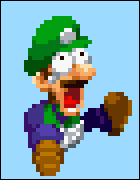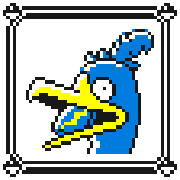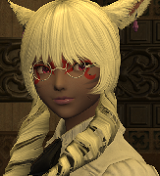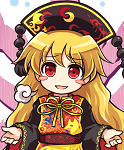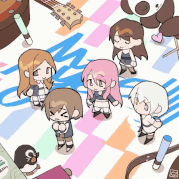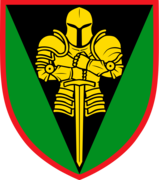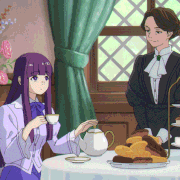|
Medusa did nothing wrong
|
|
|
|

|
| # ? May 6, 2024 14:00 |
|
Supremezero posted:In hollow ataraxia she likes Poseidon and calls him her boyfriend, which... presumably would not happen with the rape backstory. Saber Medusa has Athena stuff mixed into her Saber SG due to the same reason she gets Harpe as a Lancer so it could be her resentment against the gods in general (cause even if she was fine with Poseidon pre-Gorgonization after Athena cursed her she wouldn't be so happy) getting an oomph against Poseidon because you know, rivalries. Anyways, I had a weird question about completition in Samurai Remnant since I'm close to my second ending. I know to unlock the Battle Recollections related to an ending you need to load the Clear file, but for the logbook entries, could I do Ray of Light, reload a past save, go for the Third Ending, Snake variant but then do a NG+ with the Ray of Light save for the Rat variant of the third ending? TL, DR: Are logbook entries global or by savefile? Cause in the second case you have to beat the game 4 times for full completition, and also I did powerlevelling on Ray of Light and also got some maxed mountings and I don't wanna have to use third ending for NG+.
|
|
|
|
https://x.com/kohakudoori/status/1785824196117115026
|
|
|
|

|
|
|
|
GateOfD posted:i think the lesson in UBW is that going the Archer route is actually bad. My interpretation of UBW (which could definitely be wrong, since it's been a Really Long Time since I played or watched it) is something like this (I added tags just because I'm not sure of this thread's policy): Archer is correct that his path is awful for Shirou as a person. But Shirou decides that, even if it's bad for himself, it's still worth living a life of helping others as much as possible (and Archer's life was also worthwhile, even if it ended poorly for him personally). So when he says Archer is "correct but not right" (or whatever that line is), it means that Archer is 100% correct about "this will make you miserable," but that this doesn't mean he was wrong to effectively sacrifice himself for the good of the world. And it seems implied that the presence of Rin (and maybe also "having met and learned from his future self") will help him to live such a life without losing himself to despair. HF isn't really a repudiation of this so much as just offering an alternate path of "it's fine to prioritize the lives and happiness of yourself and your loved ones."
|
|
|
|
Ytlaya posted:My interpretation of UBW (which could definitely be wrong, since it's been a Really Long Time since I played or watched it) is something like this (I added tags just because I'm not sure of this thread's policy): I'd say that read is generally correct, though I would add one of the important aspects of Archer's critique of the Hero of Justice path is that the ideals Shirou is so eager to sacrifice his happiness for aren't even his ideas. They're an imitation of Kiritsugu's, and he only adopted them because Kiritsugu saved his life and seemed happy because he did so. Shirou is deeply traumatized and his entire ability to evaluate right and wrong, happiness and sadness, etc, have been warped by survivor's guilt and PTSD from living through the hell of the 4th War Fire and losing his entire identity in the process. Archer's retrospective regrets come from the realization that when he died a pariah on a hill of swords without his hands ever holding anything, he took comfort in the idea that it was a worthwhile sacrifice because he saved people... and then went on to be employed by The World as a killing machine for the sake of preserving humanity, the most twisted form of his ideal, which in turn forced him to confront the truth that the ideal had never been his idea in the first place. His suffering and sacrifice of any chance at personal happiness appeared to have been for the sake of a worthless facade. Shirou's response to this is to reject Archer's interpretation of their path, to condemn it as a weakness or imperfection that he can overcome if he simply never surrenders to despair. This not only comes out in their actually confrontation ("The one person I refuse to lose to is myself!") but through the metaphor of the magic of projection, in which the strength of the weapon is entirely dependent on the clarity of the mind that imagines it. Shirou eventually overcomes Archer because his vision of The Sword In His Mind becomes purer because his conviction to carry on is stronger than Archer's conviction to stop him. This metaphor is then further culminated in the fight with Gilgamesh, where Shirou proved decisively that an imitation (ie, the ideals he copied from Kiritsugu) CAN surpass the original.
|
|
|
|
Hmm, I would have to add that Kiritsugu's ideal is NOT Shirou's ideal, and it never has been. Kiritsugu's ideal was a purely Utilitarian one: "sacrificing the few to save the many is always the right choice, and should be done without regret or hesitation." Whereas Shirou's ideal was "Kiritsugu looked awfully happy when he saved me... I wish I could ever be as happy as he was back then." Or more concretely, Shirou finds meaning in the act of helping people, of being with them and for them. This is actually the complete opposite of Kiritsugu's ideal (which was the point of HF). This is also why Archer's life was such a tragedy: if he had ever actually believed in Kiritsugu's ideals from the bottom of his heart, he'd have nothing to regret. But he didn't, all he ever wanted was to help the people he loved and maybe get a sliver of the joy he'd seen in Kiritsugu. And so becoming a counter guardianówho only ever saw the worst of humanity but was removed from the picture before getting to experience any of the fruits of his effortsówas his own personal Hell.
|
|
|
|
id put the divide as kiritsugu wants to do the objectively right thing, and save people in the most practical manner possible. shirou doesnt want to save people in a detached way, he wants to save people's like, souls. like be a hero. theres that throwaway scene of him watching kamen rider and power rangers type stuff and thats the type of hero he wants to be, basically - he wants to show up, beat up a bad guy, and make the character of the week's life better. he wants to actually make people happy. this divide is shown in saber's backstory. saber objectively made life in britain much better, but she made no effort to assuage people's worries and fears, or make them happier. she was a distant king who never once smiled. they looked up to her as a distant, godly figure, not as someone who made them happy. its what led to the uprising and the end of her life. this is why heaven's feel is the capstone to his character, more than good self-sacrifice vs bad self-sacrifice. in ubw, its more rin who manages to make archer smile and save his soul, shirou doesnt really do anything like that. and in fate, saber more realizes things about herself. in hf, shirou manages to carve out a space where sakura can smile and be happy. he saved her in the way he wanted to save someone. Endorph fucked around with this message at 13:45 on May 3, 2024 |
|
|
|
HF is definitely about how Shirou has spent his young years aimlessly chasing that abstract "save people" high-minded notion so he can perhaps attain the happiness that in his heart of hearts he doesn't feel he deserves, only to realize that not only has he been taking for granted the happiness people in his life were already bringing him just by their everyday presence, but that they've also been in desperate need of help (that he kept making himself excuses not to notice or get involved in) long before the situation devolved into a near apocalyptic life-and-death matter.
|
|
|
|
Sanguinia posted:I'd say that read is generally correct, though I would add one of the important aspects of Archer's critique of the Hero of Justice path is that the ideals Shirou is so eager to sacrifice his happiness for aren't even his ideas. They're an imitation of Kiritsugu's, and he only adopted them because Kiritsugu saved his life and seemed happy because he did so. Shirou is deeply traumatized and his entire ability to evaluate right and wrong, happiness and sadness, etc, have been warped by survivor's guilt and PTSD from living through the hell of the 4th War Fire and losing his entire identity in the process. Archer's retrospective regrets come from the realization that when he died a pariah on a hill of swords without his hands ever holding anything, he took comfort in the idea that it was a worthwhile sacrifice because he saved people... and then went on to be employed by The World as a killing machine for the sake of preserving humanity, the most twisted form of his ideal, which in turn forced him to confront the truth that the ideal had never been his idea in the first place. His suffering and sacrifice of any chance at personal happiness appeared to have been for the sake of a worthless facade. That's true, though I think it can be impossible to fully divorce "the things you've seen/experienced" from "who you are and what you want. After all, a person is largely defined by their experiences. So I wouldn't say that "the ideals Shirou absorbed from seeing Kiritsugu's reaction to saving him" are "false ideals" exactly (and as someone else mentioned, Shirou isn't really imitating Kiritsugu's hyper-utilitarian ideals so much as having a deep reaction to Kiritsugu's feelings about saving him). So I think an optimistic interpretation of UBW could be that meeting Archer at least allows Shirou to make an informed decision. He comes face to face with the root of his values/desires and is able to clarify and pursue them in a more healthy manner (and at this point, it's at least his own conscious decision and something he can "take ownership of," whereas Archer seems like he was mostly oblivious until the time of his death). With this in mind I guess you could distinguish UBW and HF in this way: UBW is about Shirou coming face to face (literally) with the nature and root of his ideals and making the more informed decision to continue fighting for them. HF is instead Shirou more "independently" realizing what he wants. More subjectively, I'm not really a big fan of Sakura's character as a concept and plot device (even if you removed the most hosed up elements), which influences my feelings about the routes given how central she is to HF.
|
|
|
|
When people say that Shirou's ideals are "vague" what they mostly mean is that he declares himself to be willing to "make sacrifices" to "save people", but the exact nature of those sacrifices and of that salvation is undefined, so that it's not actually possible to make reasonable decisions about whether the sacrifices will be "worth it." This makes sense to Shirou because Shirou has massive survivor's guilt and wants to make himself suffer, so any amount of suffering on his part seems like a worthy sacrifice for any amount of salvation for somebody else. In UBW, he gets the information that this path will be "bad" and maybe shifts his plans, a little bit? but he doesn't really change that fundamental calculus.
|
|
|
|
re: Shirou's ideals aren't actually Kerry's ideals, remember that Shirou didn't actually know what Kerry's utilitarian ideals were until the Fifth War. He told Shirou that he wanted to be a Hero of Justice but that he couldn't because he'd "grown too old," explaining in the vaguest possible terms about ideas that get in the way of saving everybody like "you can't save everyone because once you pick a side, someone is your enemy," and whatnot. Lil' Shirou's response to all this was "If you can't be a Hero of Justice I'll just do it for you!  " which Kerry just accepted with a smirk, presumably because he didn't want to make a small child miserable by trying to argue why that thinking was wrong. This is the "copied ideal" Archer is talking about, not Kerry's ACTUAL beliefs as he practiced them. " which Kerry just accepted with a smirk, presumably because he didn't want to make a small child miserable by trying to argue why that thinking was wrong. This is the "copied ideal" Archer is talking about, not Kerry's ACTUAL beliefs as he practiced them.
|
|
|
|

|
| # ? May 6, 2024 14:00 |
|
https://www.youtube.com/watch?v=0gPEmrJL8PQ
|
|
|



